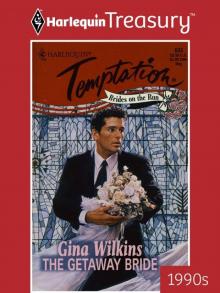- Home
- Gina Wilkins
The Stranger In Room 205 (Hot Off The Press Book 1) Page 3
The Stranger In Room 205 (Hot Off The Press Book 1) Read online
Page 3
But still he lied. For he, himself, was afraid of the truth.
He heard her close the cover of the clipboard. “All right,” she said. “That’s enough for now.”
Sam let out a long, ragged breath when he was finally alone again. He was so fatigued he could hardly move, both mentally and physically exhausted. Every inch of him ached. He needed rest. He wanted out of this place. He hadn’t a clue where he would go when he left.
He didn’t even know what he looked like, but there were a few things he’d learned about himself during the past couple of hours. He had more pride than was good for him, he didn’t like admitting weakness or vulnerability and he utterly hated being at the mercy of others.
All those traits felt familiar to him. Felt right. So who the hell was he? And why couldn’t he remember?
He really was a nice-looking man beneath the bruises. Even flat on his back in a hospital bed, there was a sort of…well, grace to him, Serena mused the next morning, studying Sam from the chair beside the bed. His lips were slightly parted, and he wheezed a little when he breathed—a result of the blows he’d taken to his chest. His lashes were long against his scraped cheeks, oddly dark in contrast to his golden hair. Those thick curling lashes were the only softening feature on his firmly carved face.
She thought of the sketchy history he’d given Dan. He’d implied that he was a rootless drifter, rambling from place to place, supporting himself with temporary jobs. No permanent home, no family. Looking again at his beautifully shaped hands, marred only by the abrasions across his knuckles, she wondered what the odds were that those temporary jobs had involved sitting behind desks crunching numbers. She found it hard to believe those rather elegant hands had ever wielded a shovel or a sledge hammer. And if his clean oval nails hadn’t been professionally manicured recently, she’d kiss her sister’s dog—right on his slobbery mouth.
Raising her gaze from the man’s hands to his face, she was momentarily disconcerted to find his brilliant blue eyes open and trained unblinkingly on her. “Oh. Good morning.”
“Serena.”
He said her name as if it was important that he had remembered it. She nodded. “Serena Schaffer.”
“You’re the one who found me.”
“Yes. How are you feeling?”
“Tired. Have you ever tried to sleep in a hospital?”
“No. I’ve never been hospitalized.”
“I don’t recommend it. Every few minutes someone comes in to draw blood, take your blood pressure and temperature and listen through a stethoscope that feels like it’s stored in a freezer. They’re obsessed with my bodily fluids—intake and output. Every time I try to move into a more comfortable position, this damned IV pump starts beeping, nagging at me to be still.” To demonstrate, he bent his right arm, kinking the thin tube that ran from the IV pump to the needle taped into the back of his hand. A moment later the pump began to beep, and darned if it didn’t sound petulant. Sam sighed and straightened his arm. The machine went silent.
Serena had waited patiently through his litany of complaints. “Does it feel better to have that off your chest?”
His bruised mouth quirked. “A bit.”
“Then I’m glad I was here to listen.”
“I guess I unloaded on you because you’re the first person to come into this room in hours who wasn’t carrying a needle.”
“Are you sure there isn’t someone I can call for you? A friend or family member who could be with you while you recover?”
“There really isn’t anyone I want notified right now. But thanks for offering.”
She wouldn’t want to be so alone in a hospital. She knew if anything happened to her, she would have legions of family and friends around her, giving her sympathy and support. She felt sorry for anyone who didn’t have that emotional base to draw strength from.
He must have read her expression. “I’m fine,” he assured her. “I’ll just be glad to get out of here.”
“Where will you go then?”
The corners of his mouth tightened. She couldn’t tell if he was annoyed with her questioning or unhappy with the answer. Was it true that he had no place to go? No one to turn to? Serena would hate to find herself in that position.
When it became obvious that he had no answer for her, she changed the subject. “I talked to Chief Meadows earlier. He said he hasn’t made any headway in finding the two men who robbed and beat you. There’s been no sign of that pieced-together pickup truck you described.”
“I’m not surprised. I don’t think they were from around here. Probably just passing through the area, looking for trouble.”
“Like you?” she asked in a murmur.
He met her eyes without blinking. “I wasn’t looking for trouble. Unfortunately, it found me, anyway.”
She knew that feeling. She hadn’t been looking for trouble when she’d found Sam Wallace in that ditch, either. But she had found him—well, her sister’s dog did—and now, for some stupid reason, she felt rather responsible for him.
The sounds of the hospital drifted in through the door she’d left partially open. Nurses talked, equipment beeped, someone coughed, someone else cried. Illness seemed to creep through the hallways like a malicious spirit, constantly trying to outsmart the few overworked doctors in this small, outdated and under-funded institution. The staff did the best they could with what they had, but most folks in these parts went elsewhere for serious medical attention, into bigger towns with more financial advantages. Serena hoped her stranger was getting the care he needed here. Head injuries were so unpredictable.
LuWanda, the heavyset nurse who’d taken care of Sam when he’d arrived, marched in. “Time to take your vitals, Mr. Wallace.”
He scowled. “You can just damned well leave my vitals alone.”
LuWanda laughed as though he’d made a lighthearted jest. “Don’t worry, I won’t touch anything I haven’t touched before. Oh, and I want to get a pulse ox reading. The doc’s still concerned about those blows you took to the chest. Have to make sure you’re getting plenty of oxygen.”
He gave Serena a look as the nurse clipped something around his right index finger. “Pulse ox,” he murmured.
She stood. “Whatever that is, I hope yours is good.”
“Ninety-nine percent,” the nurse announced when something chirped. “Better than mine—I smoked for twenty years. Guess you’re not a smoker, huh, Mr. Wallace?”
“Guess not,” he answered vaguely.
Serena took a step closer to the bed. “I have to go. Is there anything I can get for you, Sam? Books, magazines, personal items?”
“No, thank you. I’m fine.”
Definitely the independent sort, she thought. He had nothing to his name but a backless hospital gown and he still didn’t ask for anything. A very intriguing man, this Sam Wallace—whoever he was.
“Well, then—I’ll see you later.” She moved toward the door. She had no doubt that she would be back. Something about the lonely, slightly confused expression in his bright blue eyes kept pulling her here.
Was she being a complete fool to let herself get involved with him, even on this temporary and casual basis?
“Well? What did you find out about him?” Petite, red-haired, green-eyed Lindsey Gray pounced the moment Serena walked into the Evening Star offices. “You went to see him at the hospital again, didn’t you? Did you talk to him? Did you learn more details about what happened to him?”
“Lindsey, take a breath or something,” Serena ordered, shaking her head in exasperation. “Geez, you’d think we’d never seen a stranger in this town before.”
“We haven’t very often. And never quite like this—so what did you find out?”
Tucking a strand of hair behind her ear, Serena gave a little shrug. “You’ve heard as much as I have. He said he was hitching through this area looking for temporary work when two men in a patched-together pickup truck gave him a ride, robbed him, beat him up and left him for dead in t
hat ditch. He can’t describe the men very well because he has very little memory of the beating—a slight memory loss due to the concussion, which the doctor said is normal.”
“Where’s he from? What’s his story?”
“I don’t know. He didn’t say, and I didn’t ask many questions. He’s in a lot of discomfort, Lindsey. He isn’t up to being interviewed.”
Lindsey pouted. She was the only twenty-five-year-old woman Serena knew who could actually pout and get away with it.
To her disgust, Lindsey was destined to be thought of as cute, when what she really wanted to be was sharp and sophisticated. After obtaining a degree in journalism, she had gone to work for a newspaper in Little Rock for a couple of years before moving back to her little hometown to be close to her father, who was in ill health. She’d taken a significant pay cut to work for the Evening Star, but she took the job very seriously, attacking it with the same dedication she’d have given a position with the Washington Post or New York Times.
Sometimes Serena thought Lindsey took her job too seriously. She was constantly on the lookout for the “big story”—and the truth was, there just weren’t that many big stories in Edstown. With the exception of a recent rash of burglaries, not much happened around these parts. She mercilessly hounded the mayor and poor Chief Meadows, both of whom held a deep distrust of reporters and an ingrained aversion to any bad press about their town. But there was no doubt that the newspaper had been better since Lindsey arrived.
Speaking of which, Serena glanced around the unarguably shabby offices, which were quiet and deserted now that the evening edition had been printed and delivered. She knew some people were born with ink in their veins, that the smell of newsprint and the sounds of press machines gave them an almost sexual thrill. Serena looked around and saw only clutter and chaos.
She had never wanted to own her great-grandfather’s newspaper. That had been the destiny of her older sister, Kara. Serena was a lawyer, not a newshound, and she would just as soon have kept it that way. Unfortunately, there’d been no one else to take over after their father died last year, and three months later Kara left town with a wanna-be country music star, leaving Serena with Kara’s stupid dog and full responsibility for Great-granddad’s newspaper. Her first impulse had been to sell, but the very idea had distressed her mother so much that Serena had reluctantly agreed to give it a shot.
“Where’s Marvin?” she asked, glancing at the managing editor’s empty office. “He and I were supposed to discuss last month’s ad revenues this evening.”
Lindsey rolled her eyes. “Where do you think he is? He decided to pop over to Gaylord’s for a ‘quick nip’ before your meeting. That was two hours ago.”
There would be no discussing anything with Marvin tonight, Serena thought with a grimace. The aging editor—a longtime crony of her late grandfather’s—had been spending more and more time at Gaylord’s since his wife died two years ago. Marvin was tired and lonely and burned out, resistant to modern technology, nostalgic for the old days, but he didn’t want to retire. He’d said he would have no reason at all to get out of bed if he didn’t have a job to go to. As much as she truly hated the very thought, Serena was beginning to believe that she was going to have to pressure Marvin into retirement. It broke her heart, but it was rapidly becoming necessary.
Damn it, Kara, this should be your job.
Pushing a hand through her hair, she sighed heavily. “I’ll try to catch him tomorrow, I guess. Are you finished for the night?”
Lindsey shook her head and hoisted her oversize macramé bag onto her shoulder. “I’m going to the town council meeting. I’d better get moving, it starts in ten minutes.”
“I thought Riley was covering the council meeting tonight.”
“He is. I’m just going out of curiosity. Maybe I’ll have a chance to corner Dan after the meeting to ask what he’s found out about the men who mugged your stranger.”
“He isn’t my stranger,” Serena protested, though she was uncomfortably aware she’d fallen into the habit of thinking of him that way.
Lindsey waved a hand dismissively. “I’d just like to know exactly what Dan has done. What he’s found out—about the muggers or the victim. And what he’s going to do tomorrow.”
“You know how Dan hates it when you badger him about the way he does his job.”
Lindsey broke into a bright, impish smile—the one that transformed her face from cute to strikingly attractive. “I know. Why do you think I keep doing it?”
Though she would never mention it, Serena had long suspected that Lindsey carried a secret torch for the police chief. If it was true, Lindsey’s case seemed pretty hopeless. Dan was ten years her senior and a lifelong friend of Lindsey’s older brother. He tended to regard Lindsey as his own kid sister—when he didn’t see her as an annoying member of the press. Dan had also been through a divorce so ugly and bitter the townspeople were still talking about it two years later. He had said he was in no hurry to get seriously involved with anyone again. If ever.
All in all, it seemed a distinctly unlikely match. But maybe she was wrong about Lindsey’s feelings. Maybe Lindsey just enjoyed watching Dan foam at the mouth while she buzzed around him with her stubbornly persistent questions.
“Okay, go ask your questions,” Serena said with a quick laugh. “And, Lindsey, if you find out anything, let me know, okay?”
Lindsey sketched an impudent salute. “You got it, boss.”
Twenty-four hours. The man who had dubbed himself Sam Wallace shifted restlessly in the hospital bed, tried to lift his left hand to his face, winced, then raised his right hand instead. The IV pump bleated at him to straighten his arm. He cursed it beneath his breath but laid his arm down just to shut it up.
It had been just over twenty-four hours since Serena found him in that ditch. And his head was still as empty as the tiny closet provided for the belongings he hadn’t brought with him.
Frustration was beginning to eat at him. How could he remember so many trivial details—the president of the United States, the taste of chocolate ice cream, the irritation of too-starched shirts—yet not remember his own damned name? How could he recall the name of every bloodthirsty nurse he’d encountered since he’d arrived in this place and not remember his own mother?
Maybe he should just give in and confess the truth to the next person who entered that door. Let ’em poke him and probe him, X-ray his brain and find the holes there, bring in the shrinks and neurologists and whoever else they wanted to study him like a strange bug on a microscope slide. Amnesia, they would call it, and then they would look at him like he was some sort of freak or faker, because true amnesia was damned rare. He remembered that fact. He didn’t know how.
There was a quick rap on the door and then the night nurse entered. “You doing okay, Mr. Wallace?”
“Just peachy,” he drawled. He knew he wouldn’t be spilling the truth tonight. Maybe tomorrow, if the condition hadn’t already corrected itself by then. Or maybe he’d be dead by morning, felled by obstinacy and pride. At the moment, he was finding it real hard to care.
Chapter Three
“The poor man. We have to do something to help him.”
Serena wasn’t at all surprised by her mother’s words. Marjorie Schaffer was an obsessive do-gooder. She belonged to every charitable organization in the area, had been president of most of them, had chaired every community outreach committee at her church, was still active in PTA more than ten years after her youngest daughter finished high school and would willingly give the clothes off her back to help someone in need. She had just decided that Sam Wallace fit that description.
“We have to be careful, Mother. We don’t really know anything about this guy,” Serena said, shaking a finger warningly at her mother. Dressed in baggy pajamas, she sat at the table in the kitchen, a cup of tea in front of her and her sister’s dog snoring at her feet. Her mother sat across the table in a matched peignoir set, her hair and makeup so per
fect she looked as though she was posing for a photograph in a women’s magazine.
Marjorie didn’t seem at all concerned about Serena’s admonition. “You’ve spoken with him twice. You said he seemed quite pleasant.”
“Right. And Ted Bundy was known for his charm,” Serena retorted. “Really, Mother, this Sam Wallace could be a con man or a criminal, for all we know. It doesn’t make sense that he was just drifting through this area without a car or a destination. He hasn’t divulged anything about who he really is or where he’s from.”
“Obviously, he’s a man who’s down on his luck and in need of compassion. We’ll have to see what we can do to help him.”
Serena grimaced. “At least wait until Dan finishes his investigation before you get involved, will you? As suspicious as Dan is of outsiders, he’ll make it a point to find out if there’s any reason for us to be wary of Mr. Wallace.”
Marjorie murmured something noncommittal, then changed the subject before Serena could nag a promise from her. “Did I mention that Kara called while you were at work today?”
That too-casual announcement made Serena sit up straighter. “She did? How is she? Has she come to her senses? Is she coming home to take her place at the paper and reclaim this idiot mutt of hers?”
Marjorie’s laugh was tinged with just a hint of wistfulness. “I’m afraid not. She is still desperately in love with Pierce and determined to help him become a country music star. She’s waiting tables at a little nightclub outside of Nashville while he sings there three nights a week hoping to be discovered.”
Serena groaned. She honestly wondered if her older sister had lost her mind. Kara had always been as responsible and dependable as Serena, outwardly content to settle in Edstown and take over the family-owned newspaper. She’d been engaged briefly during her senior year of college, but that hadn’t worked out, and she’d seemed in no rush to get involved again.
Marjorie had often fretted that neither of her daughters was anxious to marry and start families, both focused more on establishing their careers and their independence than finding the right men. “Too picky,” she had called them, reminding them often that there weren’t many single males to choose from in this area and advising them to grab a couple before they were all gone.

 The Rebel's Return
The Rebel's Return Husband for a Weekend
Husband for a Weekend Healed with a Kiss
Healed with a Kiss Hero For the Asking
Hero For the Asking The Family Plan
The Family Plan In High Gear
In High Gear It Takes A Cowboy (Heart Of The West #5)
It Takes A Cowboy (Heart Of The West #5) That First Special Kiss
That First Special Kiss The Boss's Marriage Plan
The Boss's Marriage Plan The Doctor's Undoing
The Doctor's Undoing The Texan's Tennessee Romance
The Texan's Tennessee Romance A Match for Celia
A Match for Celia The Texan's Surprise Baby
The Texan's Surprise Baby A Proposal at the Wedding
A Proposal at the Wedding Hearts Under Caution
Hearts Under Caution Yesterday's Scandal
Yesterday's Scandal Tempting Tara
Tempting Tara Make-Believe Mistletoe
Make-Believe Mistletoe Seducing Savannah
Seducing Savannah The Man Next Door
The Man Next Door Conflict of Interest (The McClouds of Mississippi)
Conflict of Interest (The McClouds of Mississippi) The Getaway Bride
The Getaway Bride A Reunion And A Ring (Proposals & Promises Book 1)
A Reunion And A Ring (Proposals & Promises Book 1) A Night To Remember
A Night To Remember Undercover Baby
Undercover Baby A Wish For Love
A Wish For Love Matched by Moonlight
Matched by Moonlight A Home for the M.D.
A Home for the M.D. Surprise Partners
Surprise Partners Almost Famous
Almost Famous Adding to the Family
Adding to the Family Seductively Yours
Seductively Yours The Soldier's Forever Family
The Soldier's Forever Family It Takes a Hero
It Takes a Hero Private Partners
Private Partners The Secret Heir
The Secret Heir I Won't!
I Won't! The Right Twin
The Right Twin The M.D. Next Door
The M.D. Next Door Cody's Fiancee
Cody's Fiancee Enticing Emily
Enticing Emily Prognosis: Romance
Prognosis: Romance Countdown To Baby (Merlyn County Midwives #2)
Countdown To Baby (Merlyn County Midwives #2) Doctors in the Wedding
Doctors in the Wedding The Stranger In Room 205 (Hot Off The Press Book 1)
The Stranger In Room 205 (Hot Off The Press Book 1) Love Lessons
Love Lessons The Best Man's Plan (Special Edition)
The Best Man's Plan (Special Edition) Bachelor Cop Finally Caught? (Hot Off The Press Book 2)
Bachelor Cop Finally Caught? (Hot Off The Press Book 2) Date Next Door
Date Next Door A Valentine Wish
A Valentine Wish Secretly Yours
Secretly Yours All I Want for Christmas
All I Want for Christmas The Road to Reunion
The Road to Reunion Valentine Baby
Valentine Baby His Best Friend's Wife
His Best Friend's Wife Diagnosis: Daddy
Diagnosis: Daddy The Groom's Stand-In (Special Edition)
The Groom's Stand-In (Special Edition) Her Very Own Family
Her Very Own Family The Littlest Stowaway
The Littlest Stowaway